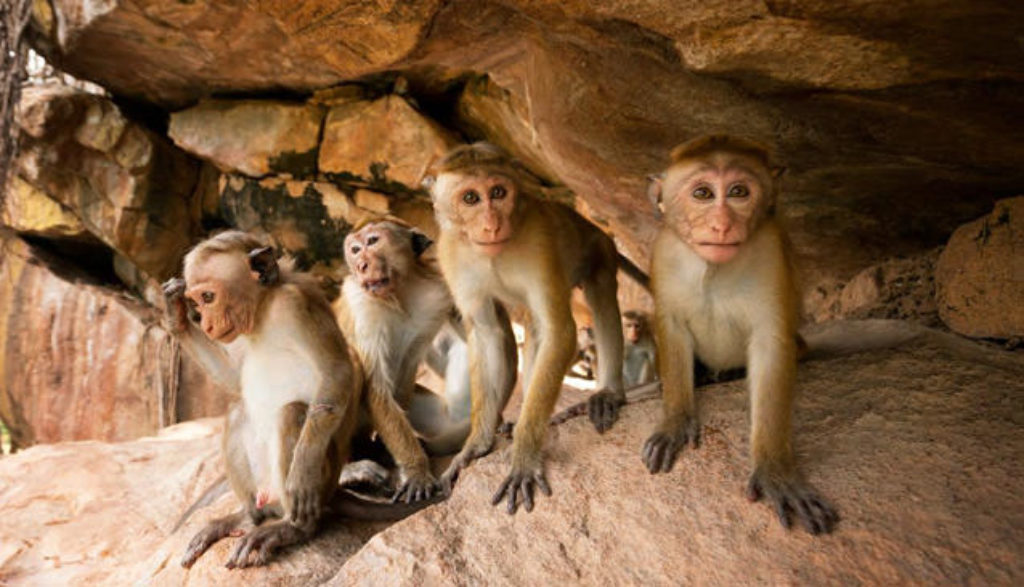
Deep in the heart of tropical Sri Lanka, there once was a kingdom where humans erected buildings and temples and gigantic statues of the Buddha. The kingdom was eventually overrun by the forest. And the people abandoned it.
But nature, as has often been said, abhors a vacuum. And there’s no reason why a perfectly good kingdom should go to waste. At least that’s what the troop of toque macaque monkeys who moved in seem to think.
For generations, the macaques have made their home in these verdant relics, as well as in a huge granite outcropping overlooking this inherited kingdom, named Castle Rock.
It’s called Castle Rock by humans, not the monkeys, of course. The monkeys are content to spend their days collecting figs, grooming one another, napping and frolicking. And if that sounds like primate paradise, well, it is … at least for those at the apex of this particular monkey kingdom.
Macaques have a rigid social order. Members of the privileged elite, ruled by an alpha male (Raja) and his three queens (The Sisterhood), have dibs on all the best food. And they treat “lesser” monkeys like servants.
Among those in the hardworking underclass is Maya, an outcast of sorts whose destiny seems to be to serve her betters all of her long life—just as her parents did before. But when a new male (Kumar) shows up to plead for entrance into the monkey tribe, he develops a “thing” for Maya. Soon Maya’s got an infant (Kip). But Raja and his queens, well, they don’t think much of Kumar. And he’s driven off.
If all this sounds like a primate play on 90210—or maybe we should call it Mean Monkeys—it kind of is. Presented in an adorable, Disney kind of way, of course. Monkey Kingdom follows the narrative template of previous Disneynature species-focused offerings: African Cats, Chimpanzee and Bears, with the directors from those films (Mark Linfield and Alastair Fothergill) helming this one, too.
Maya fights for survival, fights her fellow monkeys and fights to keep Kip alive. An invasion of rival macaques is led by a disfigured (isn’t he always!) bad monkey ominously named Lex. Raja fails to repel the invaders, leading to a brief exile in a nearby city while the troops heal their wounds and regain their strength. Eventually, the displaced monkeys reclaim their ancestral homeland.
Quick! Somebody cue up “Hakuna Matata,” because as with all of Disneynature’s G-rated offerings, there’s a whole lotta mild monkey business aimed at young viewers here. These playful primates are irrepressibly social. And when they can’t find their own kind to play with, well, mongooses, dogs and bears will do, too. And when the monkeys forage for food among human habitats, their cute “thieving” is played strictly for laughs. (But I can’t help but think that the people of Sri Lanka view these intrepid, highly anthropomorphized interlopers much less sympathetically than will American youngsters.)
When the monkeys aren’t looking for food, they’re trying to keep from becoming a meal themselves, evading leopards and monitor lizards. Parents should know that one unsuspecting primate gets taken by surprise by a seven-foot monitor, and we see the poor creature’s lifeless body getting dragged into the undergrowth. And there’s another death in one of two clashes between the tribes, with the macaques all looking “mournfully” upon the lifeless body of their fallen “friend.” (These brief nods to the reality of life in the jungle aren’t too graphic or lingering. And the same applies to shots of the monkeys’ anatomy, by the way).
Along the way, in its own odd, monkey-minded way, Monkey Kingdom demonstrates the virtue and stability of an intact family—and with nary a word about evolution, too. When she temporarily becomes a “single mother,” Maya has a hard time protecting Kip and finding food for both of them. But when Kumar returns and is ultimately embraced by the tribe’s aging leadership, it means greater security for Maya and Kip as well.
Though the movie’s talking about animals, not people, you walk out of the theater pondering the fact that vulnerable young ‘uns do better when mom and dad are both present to protect and provide.


After serving as an associate editor at NavPress’ Discipleship Journal and consulting editor for Current Thoughts and Trends, Adam now oversees the editing and publishing of Plugged In’s reviews as the site’s director. He and his wife, Jennifer, have three children. In their free time, the Holzes enjoy playing games, a variety of musical instruments, swimming and … watching movies.